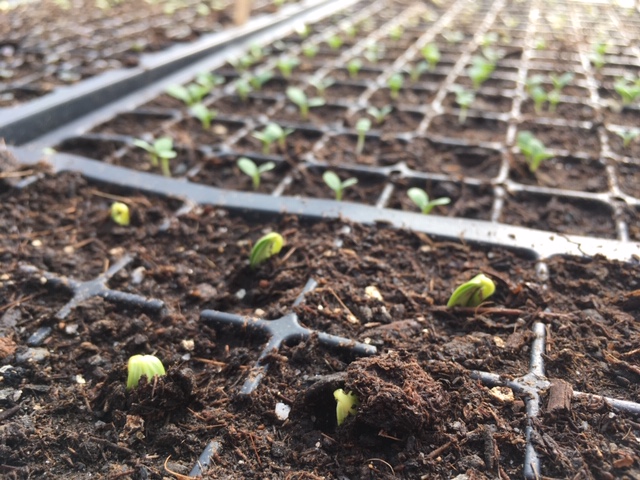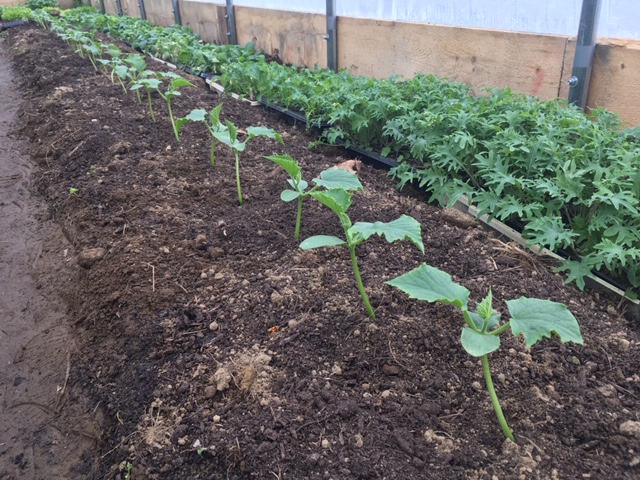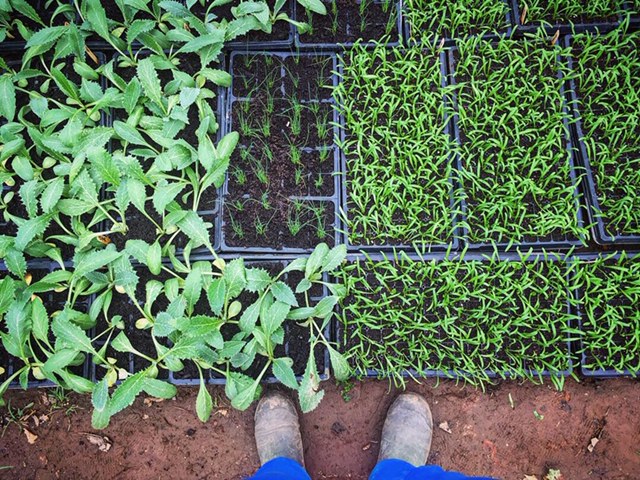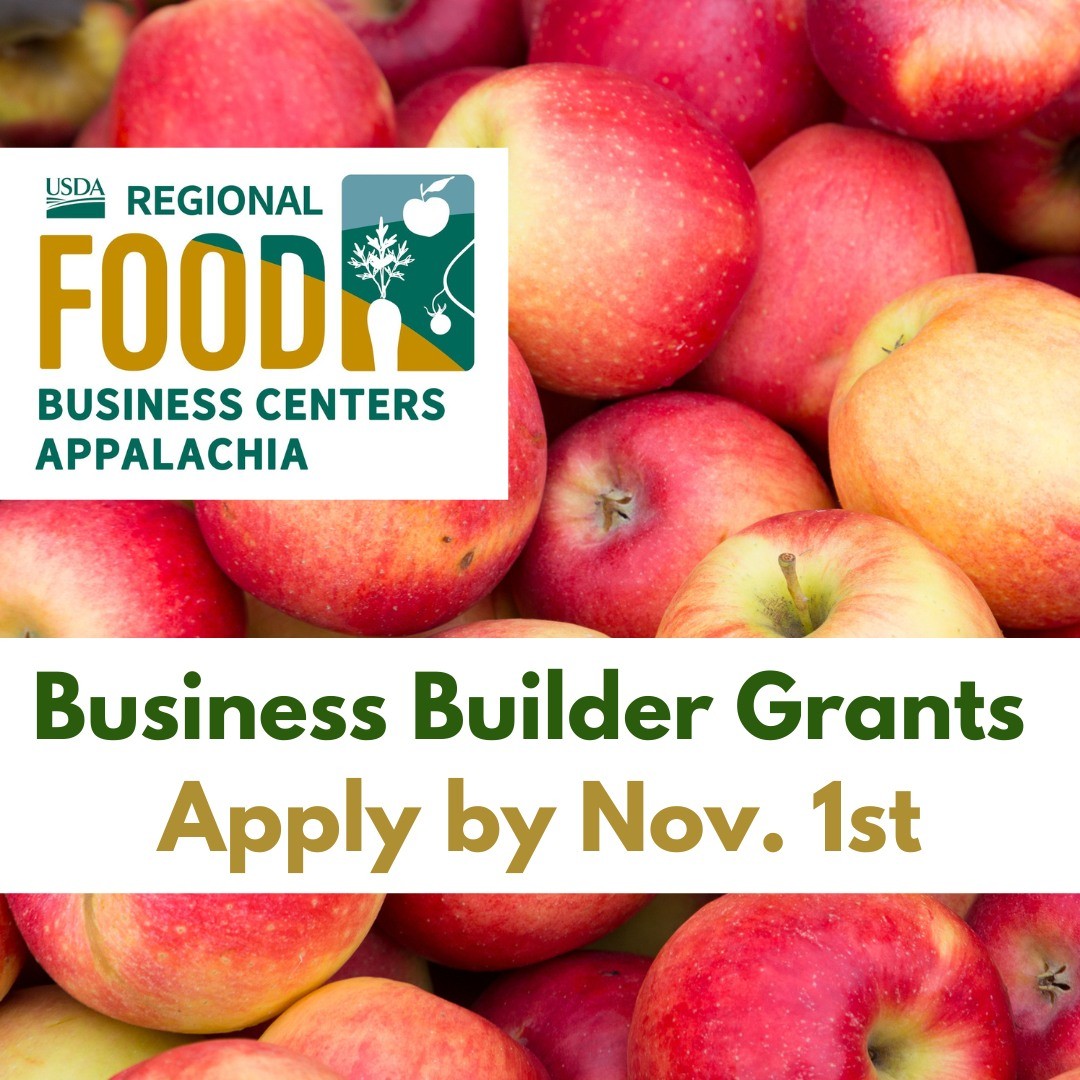Editor’s Note: This article is the second in a new series from Agrarian Trust and our contributors exploring the human side of land transition. Stay tuned for monthly posts from diverse voices, including farmers of all ages and backgrounds.
by Darby Weaver

Starting Seeds
Starting seeds in early Spring has become a rhythm for me. Just as the snow begins to recede from the hilltops and the ice begins to travel down the river, I can be found in a greenhouse with dirt under my nails, working tired muscles that have become accustomed to hibernation. I hold these tiny natural jewels in my hands, and I am overwhelmed by the potential. Each beautifully crafted form contains within it a chaos of proteins that will become organized at germination. This organization will give the plant an inclination towards the natural forces which will, in turn, allow the plant to begin to organize the environment that surrounds it. The way that the lush abundance of summertime is built—layer by layer through gathering cycles, the breakdown of winter’s casualties, and brand new beings starting from scratch—never ceases to amaze me.
My direct participation in this miracle was not something that I grew up with, exactly. The open fields that surrounded my childhood home in Lancaster County, Pennsylvania were worked by Amish families utilizing teams of mules. Agriculture was not just a way of life in this town, it was everything that I could see, feel, and smell. Dairy cows and manure are just as nostalgic to me as my maternal grandfather’s bread or catching fireflies at night. Though I grew up among these complex communities built on the exchange of homegrown and handmade goods, my emotionally tumultuous teenage years separated me from it and my nights were spent dreaming of better futures in a city nearby.
My parents are not Amish or farmers, but they always held a deep and enduring reverence for the natural world. My mother has kept plants in and around the house for as long as I can remember and most of our vacations were spent in kayaks looking for birds. When it was time for me to go to college, I was excited to leave the rural haunts and find adventure where the communion of large numbers of people spurred art, fashion, and culture in ways I could scarcely imagine. It wasn’t until the conclusion of my first year in college at the University of Pittsburgh that I realized how lucky I had been as a child and how much I needed that connection to land to be whole.
It has always felt to me that I have been following my life as opposed to leading it. Wandering along throughout my days, there has been a thread that has connected me from one life experience to my next opportunity. I transferred to Sterling College in Northeastern Vermont and began to explore how I could participate in healing the world. After a grueling internship and beautiful experiences working on and exploring local farms, it became clear to me that agriculture was not only a big part of my past, it was also to become my future. Just out of college, I entered the workforce a young, idealistic woman—eager to change the world by growing biodynamic food and nurturing a living ecology.
This is not the same story experienced by everyone who gets called back to the land. Like dandelions, young farmers appear to sprout out of every possible environment and thrive, regardless of the conditions. Whether they have grown up starting seeds with their grandparents every year of their life since birth, fell in love with the plants growing resiliently through cracks in concrete, or have just taken it up after getting their PhD in Fine Arts, there is a call in the hearts of many young people today, and that call is beckoning them to put their hands in the soil. In the face of environmental degradation, racism, sexism, exploitative capitalism, and political divisiveness, young people of all backgrounds and life experiences are cultivating justice and establishing land-based organizations within their communities, and these efforts are building into a momentum that is positively changing our world.

Hitting the Books
Mainstream institutions and universities in America have caught onto the demand for curricula and majors that focus on sustainable and regenerative agriculture practices. Many of these schools even have farms on their campuses and offer their students learning experiences cultivating crops and raising livestock. Taking this concept even further are the collection of colleges who are members of the Work College Consortium. These institutions are 4-year, liberal arts colleges that require their students to hold on- or off-campus jobs during the entirety of their enrollment. This, in many cases, reduces the cost of their education while simultaneously giving them real life experience in the working world they will be headed for after they graduate.
Colleges in the Consortium can be large or small, but they all encourage students to take initiative in providing for and maintaining the needs of their community. This is a truly unique offering that engages students deeply in the powerful kinship that can exist when a diverse collection of individuals work together to bring harmony into a shared societal system. These schools build into the learning experiences of the students not only the tools they need to articulate their gifts in this world, but also a sense of connection to others that facilitates a greater sense of responsibility for their actions and the care of the Earth and its people. Berea College, Warren Wilson College, College of the Ozarks, Sterling College, and Alice Lloyd College among others, tie their students to a real place with real people and give them the opportunity to make their mark.
The Wendell Berry Farming Program
Sterling College, which happens to be among the smallest colleges in the United States, offers a variety of ecology and agriculture driven degrees including Environmental Humanities, Sustainable Agriculture, Sustainable Food Systems, Climate Justice, and Draft Animal Power Systems. Along with these offerings is Sterling’s School of the New American Farmstead which hosts short courses intended for students and community members alike. These classes bring in experts from across the country to teach leading-edge, hands-on skills and artforms within the niche of ecological farming and food production.
Beginning in the fall of 2019, Sterling College will additionally be offering a holistic, place-based curriculum in partnership with the Berry Center in New Castle, Kentucky. This curriculum, named The Wendell Berry Farming Program, is a revolutionary step for farming education in the U.S. The two year program allows students to earn a Bachelor of Arts degree in Sustainable Agriculture from Sterling College and, due to the philanthropic support offered by the NoVo Foundation, will be free to qualified applicants. Students will not pay tuition when enrolled in the school in hopes that skilled individuals from all circumstances are able to answer the call and heal communities and landscapes, starting in Kentucky.
This special program highlights one of the great barriers young farmers face when attempting to gain the skills they need to start an agricultural business of their own. While it is very encouraging that small, liberal arts schools and mainstream universities alike are beginning to adapt to this desire within our youth to tune into the regenerative qualities of the Earth, countless college-age individuals who have endless potential are faced with insurmountable challenges when trying to pursue a degree. Communities suffering under the oppressive cycles of our exploitative culture, whether deep in a city or far out in the outskirts of a poverty-stricken, rural town, are full of gifted people who have had to put their dreams on hold due to a lack of opportunity.
Internships and WOOFing
One of the benefits of agriculture as a profession is that it is a trade. While getting a 4-year degree is a worthy pursuit for some, it is not the only way to learn the crafts and skills associated with cultivating land and fostering vitality in the local food system. Often one of the biggest costs to running a profitable farm operation is labor. There are many brilliant minds at work today that are creating evolutions of farm tools and systems that lower the amount of time each tasks takes on the farm, but it does not change the fact that most small scale operations rely on human labor to produce.
Many small scale farms provide internships where individuals eager to learn are given a stipend, food, and a place to live for a season while they learn to grow crops and raise livestock, all while contributing directly to the productivity of the farm. WWOOFing, or Willing Workers On Organic Farms, is a similar concept where young people are encouraged to come out and participate in the season with potentially less commitment than an internship but just as much opportunity to learn.
It can be argued that these experiences are primarily taken advantage of by upper-class people who have the privilege to take on positions for limited pay in order to learn or even travel the world, working on different organic farms. While all who choose to use their bodies and minds to bring vitality back into small communities and landscapes come from what could be considered good intentions, the colonization of the food movement by white people has continued to disturb the very foundation from which it was supposed to have been built. This mission of regenerative agriculture, to be inclusive to nature and diversity within food systems as a means of harnessing the homeostasis of our planet, is not necessarily represented in the diversity of people this education is offered and advertised to at large.
While the authoritative bravado of white culture and financial privilege does seep into the well meaning farming organizations and institutions of today, the movement has, all the while, been growing resiliently in Indigenous communities, through the efforts of People of Color, and even with the introduction of traditional methods brought into the U.S. by refugees. These communities have adapted their ancestral growing methods into modern techniques and have thus enhanced the overall practices of regenerative agriculture in this country. Without proper inclusion into the conference halls and classrooms of the white-dominated food movement, these communities have held onto their communal wisdoms and forced the modern agricultural conversation to acknowledge that healing the Earth includes healing the exploited cultures who have faced horrific injustices alongside the crimes committed against the land.
Soul Fire Farm
To this end, there are many organizations throughout the U.S. that have been created to support marginalized communities in their pursuit of learning to farm. Leah Penniman, author of “Farming While Black,” has been traveling the country to raise up and acknowledge the pain, history, and legacy of People of Color on the land. She travels using her voice to encourage young People of Color to gather and support one another and follow their hearts back to sowing seeds, even when the resources and opportunities are not offered to them. She is a beacon of hope in our modern foodways. She reveals modern injustices that have become so normalized that even the most liberal of allies struggle to see them. She reminds us that the status quo cannot stand any longer if a revisioning of the human relationship with the Earth is to manifest.
Leah’s own farm, Soul Fire Farm, has become a training center for the next generation of activist farmers in Petersburg, New York. This BIPOC (Black/Indigenous People of Color) led farming operation not only nurtures the land utilizing ancestral and regenerative techniques, it also teaches an assortment of skills to young People of Color hoping to find their own journey with the landscape.
Southeastern African American Farmer’s Organic Network
In Savannah, Georgia, SAAFON or Southeastern African American Farmer’s Organic Network has been working for over a decade to preserve the heritage and sustainable practices of African American growers in the southeast. This organization not only helps to ensure the economic success of Black farmers, they also train new generations of young farmers, handing down traditional wisdom. This is especially challenging in the South where the historic use of African American people as slave labor and enforced limitations to African American land ownership has caused many in the community to disassociate from agriculture. Those who have decided to connect to their heritage as growers have faced incredible strife in trying to buy land, secure loans, and make a living as an African American business owner and these are all things SAAFON continues to address.
Viva Farms
Viva Farms in northwest Washington sprouted in response to a need for bilingual farmer training. As people have immigrated from Central and South America into the U.S., they have brought with them incredible skills in the agricultural realms and for the most part have been exploited through the industrial agriculture system that has been exposed as the newest form of slave labor. Viva Farms, a nonprofit, hosts an incubator farm business and a Practicum in Sustainable Agriculture that can be used for college credit. The mission of the farm is to support aspiring and limited resource farmers and they have trained more than 700 farmers with 150 of them being primary Spanish speakers. The focus has been on Latinx community members and many of the classes are taught in Spanish or translated into Spanish to ensure participation.
Traditional Native American Farmers Association
In 1992, an intertribal meeting occurred in Gallup, New Mexico where Native farmers and elders from 72 farming families and 17 different native communities from Arizona and New Mexico gathered together with a shared vision. The goal of this meeting was to come up with a plan to revitalize agriculture for spiritual and human need. The Traditional Native American Farmers Association (TNAFA) was born and has been used as a tool to engage Native youth in the importance and power held in saving seeds and growing food. Elders in the community expressed their concern that their family scale farming traditions were not being picked up by their youth. Today the organization offers workshops, outreach, and an Indigenous Sustainable Food Systems Design Course, which highlights long traditions of Earth stewardship and which are aligned with the popularized methodologies of Permaculture.
Refugee Farmers
Some of the same oppressive forces that have consolidated agriculture in this country are wreaking havoc on human communities all across the globe. People escaping war, persecution, and natural disasters are often forced to leave their country in hopes of finding stability and safety in a foreign landscape. As many refugees have made their way into the U.S., they have been forced to change who they are and what they do to fit into the difficult capitalist workforce. For some of them, this transition begins the unraveling of their traditions and it becomes even more difficult to pass on their ancestral wisdom to their children who are immersed in western culture. Global Growers in Atlanta, Georgia and Fresh Start Farms in Manchester, New Hampshire were both founded to support the agricultural pursuits of refugees.
Global Growers
Global Growers grew out of the demand from Atlanta area refugees who were eager to incorporate their farming practices into their new home. Global Growers has supported refugees through business coaching, land access, and marketing and collaborates with growers on 22 acres of land distributed throughout metro Atlanta. The network ensures that experienced growers that are forced to relocate to Atlanta have the tools they need and access to land so they may continue their agricultural careers and support their families, doing what they love. Today, Global Growers offers hands on workshops, provides distribution services for growers, and makes naturally grown produce available to communities throughout the city.
Fresh Start Farms
Fresh Start Farms is a collective brand representing refugee farmers and gardeners participating in the New American Sustainable Agriculture Program. This program honors the agricultural expertise of refugee farmers that have arrived in New Hampshire and Maine and offers outreach including business planning, financial literacy, access to farmland and markets, and Agricultural ESL Courses, among others. These organizations, and other organizations like them across the country, understand the inherent value in every individual that becomes woven into the fabric of the U.S. Where opportunities are provided for refugee communities bringing their skills and wisdoms into our collective mind, everyone is enriched.

The Seasonality of Culture
Much like the disappearing harshness of winter’s stay, I can see the unraveling of the current agricultural tyranny losing momentum. Like the miraculous tiny seeds that I hold in my hand, each community coming together and standing firmly in their identity is a beautiful capsule of powerful creation ever ready to grow and bloom. The diversity and majesty of the Earth will not be freed from domination unless the diversity and majesty of her people are simultaneously free from oppression. I see these two things as an inevitability, and I encourage all of us to do our part to listen more than we speak, share more than we keep, and open our hearts to the great intuition guiding each of us deep from the core of the Earth.
Young farmers choose a life outside of the typical treadmill of economic success, and their journey is fraught with challenges. Supporting their efforts by buying their products, donating to organizations that work hard to support them like the National Young Farmers Coalition, and working with organizations like the Agrarian Trust to preserve farmland for use by young farmers ensures that the challenges met will not be in vain. Every obstacle along the path is a hurdle that needs to be passed in order for the entire planet to experience the deep healing it needs to stabilize. Even if our own calling is not to go out into the fields, there is so much that can be done to support those that choose that path.
As I’ve aged in this process, I have watched my interns go out into the world and use their own gifts to reform communities and close open wounds in stagnating lands. As a woman I’ve encountered my fair share of resistance, and it has made me ever aware of the brutality that exists within our current societal structure. Brutality itself persists where it is allowed, and I have been in awe of those who have put an end to it in soils and neighborhoods alike. I open myself like a sandy loam in hopes that nourishment may find us at our roots and toxicity may be flushed away. I pray always that we find the strength to not only change the aspects of our greater systems and lifestyles that cause pain in this world but also the things that persist within ourselves that prevent the world from becoming what it was always meant to be.


